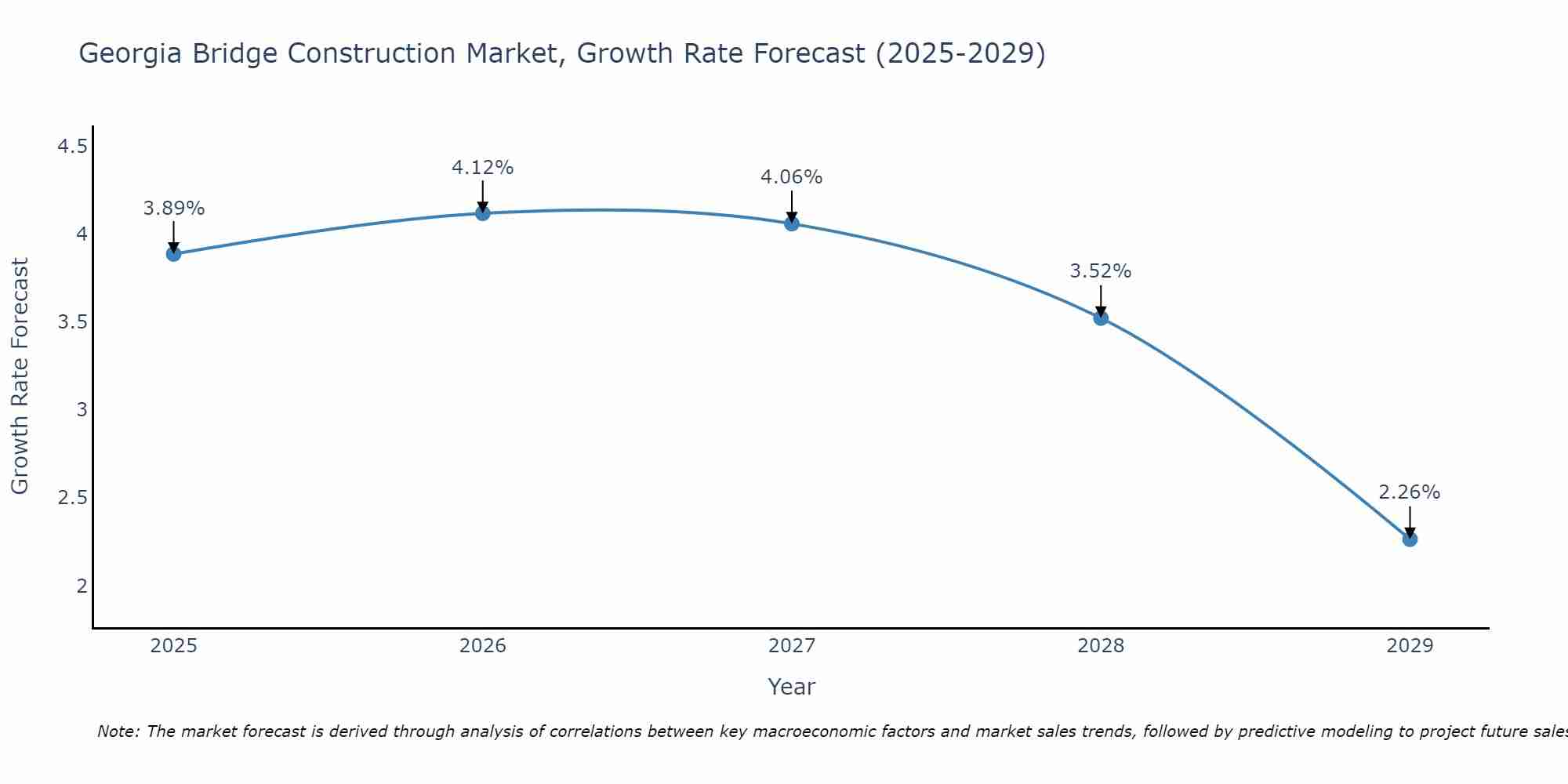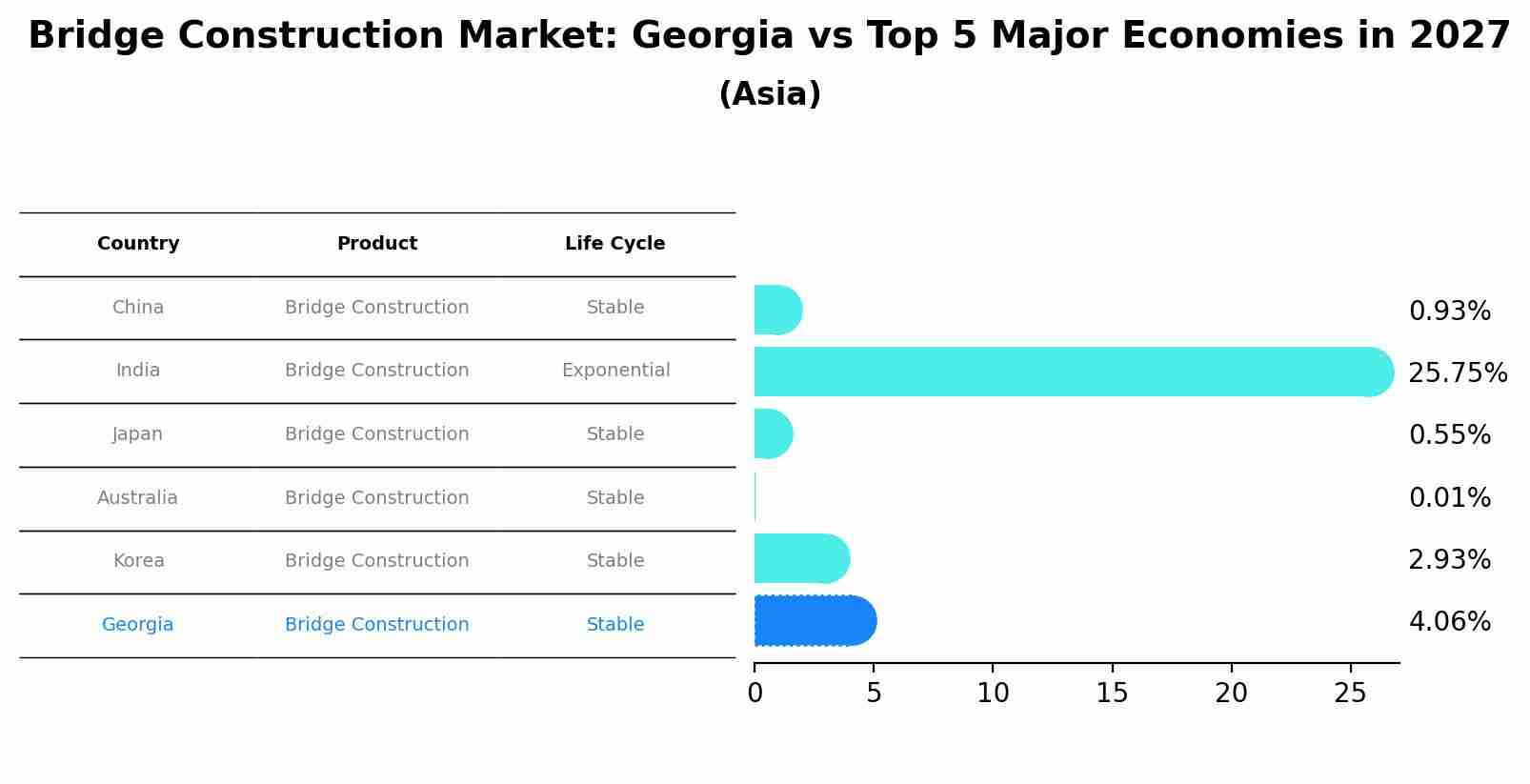Georgia Bridge Construction Market (2025-2031) Outlook | Trends, Companies, Analysis, Share, Industry, Revenue, Size, Growth, Forecast & Value
| Product Code: ETC360120 | Publication Date: Aug 2022 | Updated Date: Aug 2025 | Product Type: Market Research Report | |
| Publisher: 6Wresearch | Author: Shubham Deep | No. of Pages: 75 | No. of Figures: 35 | No. of Tables: 20 |
Georgia Bridge Construction Market Size Growth Rate
The Georgia Bridge Construction Market is projected to witness mixed growth rate patterns during 2025 to 2029. The growth rate begins at 3.89% in 2025, climbs to a high of 4.12% in 2026, and moderates to 2.26% by 2029.

Bridge Construction Market: Georgia vs Top 5 Major Economies in 2027 (Asia)
By 2027, Georgia's Bridge Construction market is forecasted to achieve a stable growth rate of 4.06%, with China leading the Asia region, followed by India, Japan, Australia and South Korea.

Georgia Bridge Construction Market Synopsis
The Georgia bridge construction market is experiencing growth due to the state`s focus on infrastructure development. With increasing population and traffic demands, there is a need for new bridge construction, as well as maintenance and repair of existing structures. Government funding and public-private partnerships play a significant role in driving projects forward, with a focus on improving safety and efficiency. Key players in the market include construction firms, engineering companies, and material suppliers, all working together to meet the demands of this sector. Technological advancements, such as the use of innovative materials and construction techniques, are also shaping the landscape of bridge construction in Georgia, ensuring the durability and sustainability of these critical transportation structures.
Georgia Bridge Construction Market Trends
Currently, the Georgia bridge construction market is experiencing a trend towards the use of advanced materials and technologies to improve the efficiency and durability of bridges. This includes the adoption of innovative construction methods such as accelerated bridge construction (ABC) techniques, which help reduce project timelines and minimize traffic disruptions. Sustainability is also a key focus, with an increasing emphasis on eco-friendly materials and designs to minimize environmental impact. Additionally, there is a growing interest in incorporating smart technologies into bridge infrastructure, such as sensors for real-time monitoring and maintenance optimization. Overall, the Georgia bridge construction market is evolving towards more sophisticated and sustainable practices to meet the demands of modern infrastructure needs.
Georgia Bridge Construction Market Challenges
In the Georgia Bridge Construction Market, some challenges faced include navigating complex regulatory requirements and permitting processes, managing project costs amidst fluctuating material and labor prices, and addressing the need for innovative and sustainable construction methods. Additionally, competition among construction firms for projects can be intense, leading to pricing pressures and potential quality concerns. Infrastructure funding uncertainties and limited government budgets also pose challenges in securing consistent project opportunities. Moreover, the aging infrastructure in Georgia necessitates the rehabilitation and replacement of many bridges, highlighting the demand for skilled labor and efficient project management practices to meet the state`s infrastructure needs while ensuring safety and quality standards are upheld.
Georgia Bridge Construction Market Investment Opportunities
The Georgia Bridge Construction Market presents promising investment opportunities due to the state`s growing infrastructure needs and commitment to improving transportation networks. With aging bridges requiring repair and maintenance, there is a demand for innovative construction technologies and materials to ensure safety and sustainability. Investors can explore opportunities in public-private partnerships for bridge projects, as well as investing in companies specializing in bridge design, construction, and maintenance services. Additionally, the introduction of smart technologies for bridge monitoring and management presents a potential growth area in the market. Overall, investing in the Georgia Bridge Construction Market offers a chance to participate in vital infrastructure development projects and contribute to the state`s economic growth.
Jordan Agar Market Government Policies
The Georgia Bridge Construction Market is significantly influenced by government policies aimed at improving infrastructure and ensuring safety standards. The Georgia Department of Transportation (GDOT) plays a crucial role in overseeing bridge construction projects through various regulations, codes, and funding initiatives. These policies focus on enhancing transportation networks, promoting sustainable practices, and adhering to federal guidelines such as the National Bridge Inspection Standards (NBIS). Additionally, public-private partnerships and state funding programs contribute to the growth of the bridge construction market in Georgia. Compliance with environmental regulations, including the Clean Water Act and the National Environmental Policy Act, is also essential in the planning and execution of bridge projects in the state. Overall, government policies in Georgia support the development of a robust and efficient bridge construction sector while prioritizing safety, quality, and sustainability.
Georgia Bridge Construction Market Future Outlook
The future outlook for the Georgia Bridge Construction Market appears promising with sustained growth projected in the coming years. Factors such as population growth, urbanization, and infrastructure development initiatives are expected to drive the demand for new bridge construction and rehabilitation projects across the state. Additionally, the focus on improving transportation networks and enhancing connectivity within and beyond Georgia will likely fuel investments in bridge infrastructure. Furthermore, advancements in construction technology, sustainability requirements, and funding support from both public and private sectors are anticipated to shape the market`s landscape. Overall, the Georgia Bridge Construction Market is poised for expansion, presenting opportunities for construction firms, engineering companies, and related stakeholders to capitalize on the growing demand for bridge infrastructure solutions.
Key Highlights of the Report:
- Georgia Bridge Construction Market Outlook
- Market Size of Georgia Bridge Construction Market, 2024
- Forecast of Georgia Bridge Construction Market, 2031
- Historical Data and Forecast of Georgia Bridge Construction Revenues & Volume for the Period 2021 - 2031
- Georgia Bridge Construction Market Trend Evolution
- Georgia Bridge Construction Market Drivers and Challenges
- Georgia Bridge Construction Price Trends
- Georgia Bridge Construction Porter's Five Forces
- Georgia Bridge Construction Industry Life Cycle
- Historical Data and Forecast of Georgia Bridge Construction Market Revenues & Volume By Type for the Period 2021 - 2031
- Historical Data and Forecast of Georgia Bridge Construction Market Revenues & Volume By Beam Bridge for the Period 2021 - 2031
- Historical Data and Forecast of Georgia Bridge Construction Market Revenues & Volume By Truss Bridge for the Period 2021 - 2031
- Historical Data and Forecast of Georgia Bridge Construction Market Revenues & Volume By Arch Bridge for the Period 2021 - 2031
- Historical Data and Forecast of Georgia Bridge Construction Market Revenues & Volume By Suspension Bridge for the Period 2021 - 2031
- Historical Data and Forecast of Georgia Bridge Construction Market Revenues & Volume By Cable-Stayed Bridge for the Period 2021 - 2031
- Historical Data and Forecast of Georgia Bridge Construction Market Revenues & Volume By Others for the Period 2021 - 2031
- Historical Data and Forecast of Georgia Bridge Construction Market Revenues & Volume By Material for the Period 2021 - 2031
- Historical Data and Forecast of Georgia Bridge Construction Market Revenues & Volume By Steel for the Period 2021 - 2031
- Historical Data and Forecast of Georgia Bridge Construction Market Revenues & Volume By Concrete for the Period 2021 - 2031
- Historical Data and Forecast of Georgia Bridge Construction Market Revenues & Volume By Composite Material for the Period 2021 - 2031
- Historical Data and Forecast of Georgia Bridge Construction Market Revenues & Volume By Application for the Period 2021 - 2031
- Historical Data and Forecast of Georgia Bridge Construction Market Revenues & Volume By Road & Highway for the Period 2021 - 2031
- Historical Data and Forecast of Georgia Bridge Construction Market Revenues & Volume By Railway for the Period 2021 - 2031
- Georgia Bridge Construction Import Export Trade Statistics
- Market Opportunity Assessment By Type
- Market Opportunity Assessment By Material
- Market Opportunity Assessment By Application
- Georgia Bridge Construction Top Companies Market Share
- Georgia Bridge Construction Competitive Benchmarking By Technical and Operational Parameters
- Georgia Bridge Construction Company Profiles
- Georgia Bridge Construction Key Strategic Recommendations
Frequently Asked Questions About the Market Study (FAQs):
- Single User License$ 1,995
- Department License$ 2,400
- Site License$ 3,120
- Global License$ 3,795
Search
Related Reports
- Vietnam System Integrator Market (2025-2031) | Size, Companies, Analysis, Industry, Value, Forecast, Growth, Trends, Revenue & Share
- ASEAN and Thailand Brain Health Supplements Market (2025-2031) | Strategy, Consumer Insights, Analysis, Investment Trends, Opportunities, Growth, Size, Share, Industry, Revenue, Segments, Value, Segmentation, Supply, Forecast, Restraints, Outlook, Competition, Drivers, Trends, Demand, Pricing Analysis, Competitive, Strategic Insights, Companies, Challenges
- ASEAN Bearings Market (2025-2031) | Strategy, Consumer Insights, Analysis, Investment Trends, Opportunities, Growth, Size, Share, Industry, Revenue, Segments, Value, Segmentation, Supply, Forecast, Restraints, Outlook, Competition, Drivers, Trends, Demand, Pricing Analysis, Competitive, Strategic Insights, Companies, Challenges
- Europe Flooring Market (2025-2031) | Outlook, Share, Industry, Trends, Forecast, Companies, Revenue, Size, Analysis, Growth & Value
- Saudi Arabia Manlift Market (2025-2031) | Outlook, Size, Growth, Trends, Companies, Industry, Revenue, Value, Share, Forecast & Analysis
- Uganda Excavator, Crane, and Wheel Loaders Market (2025-2031) | Strategy, Consumer Insights, Analysis, Investment Trends, Opportunities, Growth, Size, Share, Industry, Revenue, Segments, Value, Segmentation, Supply, Forecast, Restraints, Outlook, Competition, Drivers, Trends, Demand, Pricing Analysis, Competitive, Strategic Insights, Companies, Challenges
- Rwanda Excavator, Crane, and Wheel Loaders Market (2025-2031) | Strategy, Consumer Insights, Analysis, Investment Trends, Opportunities, Growth, Size, Share, Industry, Revenue, Segments, Value, Segmentation, Supply, Forecast, Restraints, Outlook, Competition, Drivers, Trends, Demand, Pricing Analysis, Competitive, Strategic Insights, Companies, Challenges
- Kenya Excavator, Crane, and Wheel Loaders Market (2025-2031) | Strategy, Consumer Insights, Analysis, Investment Trends, Opportunities, Growth, Size, Share, Industry, Revenue, Segments, Value, Segmentation, Supply, Forecast, Restraints, Outlook, Competition, Drivers, Trends, Demand, Pricing Analysis, Competitive, Strategic Insights, Companies, Challenges
- Angola Excavator, Crane, and Wheel Loaders Market (2025-2031) | Strategy, Consumer Insights, Analysis, Investment Trends, Opportunities, Growth, Size, Share, Industry, Revenue, Segments, Value, Segmentation, Supply, Forecast, Restraints, Outlook, Competition, Drivers, Trends, Demand, Pricing Analysis, Competitive, Strategic Insights, Companies, Challenges
- Israel Intelligent Transport System Market (2025-2031) | Strategy, Consumer Insights, Analysis, Investment Trends, Opportunities, Growth, Size, Share, Industry, Revenue, Segments, Value, Segmentation, Supply, Forecast, Restraints, Outlook, Competition, Drivers, Trends, Demand, Pricing Analysis, Competitive, Strategic Insights, Companies, Challenges
Industry Events and Analyst Meet
Our Clients
Whitepaper
- Middle East & Africa Commercial Security Market Click here to view more.
- Middle East & Africa Fire Safety Systems & Equipment Market Click here to view more.
- GCC Drone Market Click here to view more.
- Middle East Lighting Fixture Market Click here to view more.
- GCC Physical & Perimeter Security Market Click here to view more.
6WResearch In News
- Doha a strategic location for EV manufacturing hub: IPA Qatar
- Demand for luxury TVs surging in the GCC, says Samsung
- Empowering Growth: The Thriving Journey of Bangladesh’s Cable Industry
- Demand for luxury TVs surging in the GCC, says Samsung
- Video call with a traditional healer? Once unthinkable, it’s now common in South Africa
- Intelligent Buildings To Smooth GCC’s Path To Net Zero













